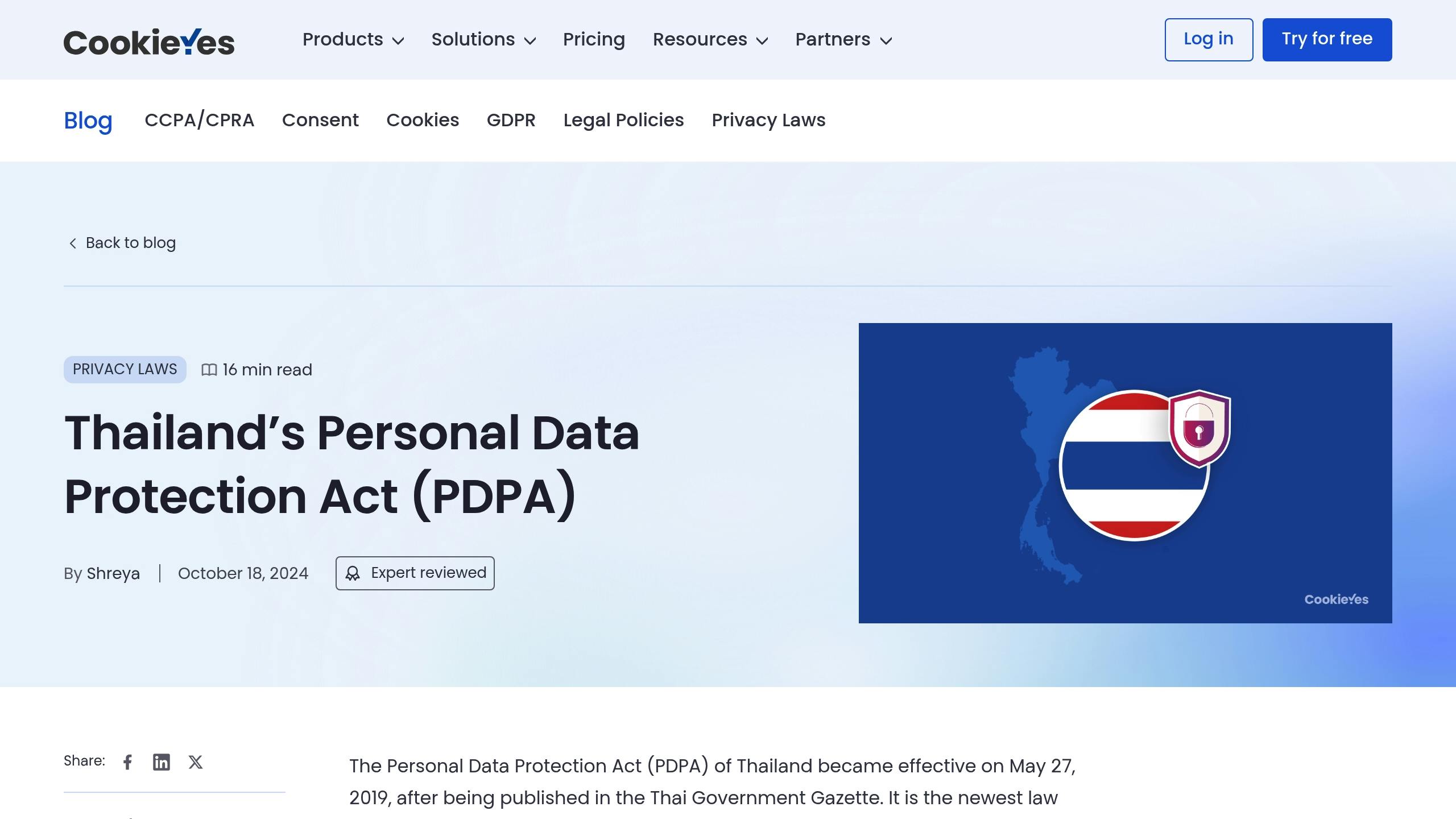
Cross-Border Data Transfers: What Expats in Thailand Must Know
Transferring personal data across borders while living in Thailand? Here’s what you need to know to stay compliant with Thailand’s Personal Data Protection Act (PDPA):
- Consent is key: Written, informed, and voluntary consent is required for most data transfers.
- Security measures: Use encryption, secure transfer methods, and strict access controls.
- Legal checks: Ensure the destination country’s data protection laws align with Thailand’s PDPA.
- Documentation: Keep records of transfer purposes, data types, recipients, and security measures.
- Exceptions to consent: Transfers may not need consent if tied to contracts, legal claims, emergencies, or public interest.
Failing to comply can lead to fines, legal action, or reputational damage. Whether sending HR files, using cloud storage, or transferring personal data, follow these guidelines to avoid trouble.
Thailand's PDPA Rules for Data Transfers

PDPA Cross-Border Transfer Requirements
Thailand's Personal Data Protection Act (PDPA) outlines clear steps for protecting personal data when transferring it overseas. Here's what data controllers need to do:
- Evaluate the destination country's data protection standards: Ensure they align with Thailand's PDPA requirements.
- Establish binding agreements: These should cover data handling practices, security protocols, retention timelines, and protection of individual rights.
- Use strong technical safeguards: This includes encryption, secure transfer methods, strict access controls, and procedures for responding to breaches.
- Keep detailed records: Document the purpose of the transfer, types of data involved, recipients, and the security measures in place.
These measures highlight the importance of compliance, setting the stage for understanding the penalties for violations.
Fines and Legal Consequences
Failing to meet PDPA cross-border transfer requirements can lead to serious repercussions, including:
- Personal accountability: Employees may be held individually responsible for breaches.
- Operational disruptions: Authorities can halt data transfers immediately.
- Damage to reputation: Public non-compliance can tarnish a company's image and future opportunities.
The PDPA's strict framework is enforced by the Personal Data Protection Committee (PDPC). The PDPC has the authority to investigate, issue compliance directives, restrict transfers, and impose penalties.
To avoid these risks, businesses should maintain thorough transfer records and regularly audit their compliance practices. Additional legal conditions for data transfers are covered in the following section.
Legal Data Transfer Conditions
Getting Data Transfer Consent
Thailand's PDPA requires consent for data transfers to be explicit, informed, freely given, and properly documented. Here's what that means:
- Explicit and informed: Clearly explain where the data is going, how it will be used, and any potential risks involved.
- Freely given: Consent must be voluntary and not coerced.
- Documented: Keep a record of when, how, and under what terms the consent was obtained.
Additional Consent Details
To meet the PDPA's consent requirements, the following details must be provided:
| Requirement | Description |
|---|---|
| Destination Countries | Specify the countries where the data will be transferred. |
| Data Categories | Define the types of personal information being transferred. |
| Transfer Purpose | Clarify why the transfer is necessary. |
| Recipient Details | Include the identity and contact information of the data recipients. |
| Protection Measures | Outline the security measures in place to safeguard the data. |
| Withdrawal Rights | Explain how individuals can revoke their consent if needed. |
Now, let's look at cases where explicit consent isn't required.
When Consent Isn't Required
Under certain conditions, the PDPA allows data transfers without explicit consent. These include:
Contract Performance
- When the transfer is necessary to fulfill contractual obligations.
- For steps requested by the data subject before entering into a contract.
Legal Claims
- To establish or defend legal claims.
- For compliance with legal obligations, court orders, or regulatory requirements.
Vital Interests
- To protect someone's life, health, or safety.
- In emergencies like medical situations or critical security incidents.
Public Interest
- For tasks carried out in the public interest.
- When exercising official authority or facilitating international government cooperation.
Standard Contractual Clauses
- Use of Binding Corporate Rules (BCRs) or Standard Contractual Clauses (SCCs).
- Adoption of certified codes of conduct or approved certification mechanisms.
Even when consent isn't required, it's essential to document the safeguards in place for all data transfers.
KPMG Insight Thai Law | EP2 Personal Data Protection Act ...

sbb-itb-0bdbfe0
Steps to Follow PDPA Transfer Rules
Meeting PDPA requirements involves keeping detailed records, implementing strong security protocols, and carefully assessing potential risks.
Key Legal Documents
To comply with the PDPA when transferring data internationally, ensure you have the following documents in place:
- Data transfer agreements
- Processing agreements
- Privacy notices
- Records of transfer activities
- Documentation of security measures
- Risk assessment reports
Data Security Measures
Once your procedures are documented, focus on safeguarding your data with reliable security practices. Here’s a quick guide:
| Security Measure | What to Do |
|---|---|
| Encryption | Use encryption standards for data in transit and at rest |
| Access Control | Implement strict authentication and authorization protocols |
| Monitoring | Maintain logs to track all data transfer activities |
| Backup | Create secure backup copies of your data |
| Incident Response | Develop clear procedures to handle potential data breaches |
Risk Assessment Steps
Identify weak points and determine the right protections by conducting a thorough risk assessment. Focus on these steps:
1. Data Classification
Sort the data by sensitivity to understand the level of protection required.
2. Destination Analysis
Review the data protection laws and standards in the country where the data will be sent.
3. Transfer Method Review
Evaluate the security of the method or platform used for transferring the data.
4. Impact Assessment
Analyze what could happen if the data is compromised during or after the transfer.
Common Questions
Here are answers to some common scenarios involving cross-border data transfers under the PDPA.
Transferring Data to Your Home Country
If you're moving personal data from Thailand to your home country, written consent is mandatory, no matter the type of data being transferred.
Using Cloud Storage Services
When using international cloud storage, ensure the provider complies with PDPA rules. Check that they implement encryption and strong security protocols to protect the data.
Transfers for Work Purposes
For work-related data transfers, written consent is required. Additionally, these transfers must adhere to strict security protocols, aligning with the PDPA's core principles.
Transfers for Personal Use
Even if you're transferring data for personal or household purposes, you still need to follow PDPA rules for consent and security.
Summary and Next Steps
This section breaks down the essential steps for complying with Thailand's PDPA requirements for cross-border data transfers and highlights expert legal support options.
To meet PDPA standards, you need to follow strict guidelines: obtain consent, secure data, and document all transfers.
Steps to Stay Compliant
- Audit and document all cross-border data transfers.
- Record consent procedures to ensure written consent is properly documented.
- Implement encryption and other data protection measures for all transfers.
- Keep detailed records of data transfer activities.
These steps set the foundation for seeking professional legal support.
Pegleg Legal Support Services

Pegleg offers tailored legal services to help you meet PDPA requirements effectively. Here’s what they provide:
| Service Type | What You Get | Key Features |
|---|---|---|
| One-Time Consultation | Quick solutions for specific issues | Licensed lawyers, in-depth compliance review |
| Subscription Plan | Ongoing support at a 35% discount | Priority service, full compliance assistance |
"Navigating Thai laws as an expat can be tricky - we make it simple. Our 100% expat-friendly lawyers provide fast, reliable, and affordable legal assistance, ensuring you stay protected and stress-free."
